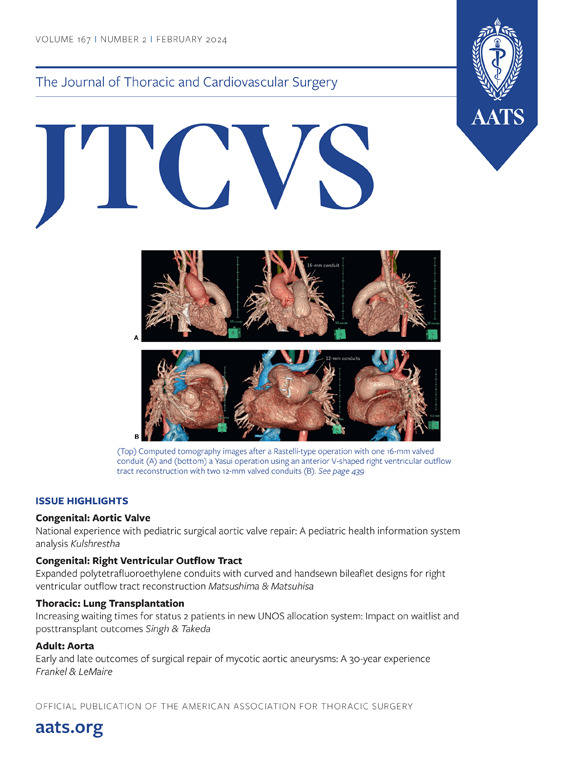评估作为肺癌手术常见问题患者资源的 ChatGPT - 一项试点研究。
IF 4.9
1区 医学
Q1 CARDIAC & CARDIOVASCULAR SYSTEMS
Journal of Thoracic and Cardiovascular Surgery
Pub Date : 2024-09-24
DOI:10.1016/j.jtcvs.2024.09.030
引用次数: 0
摘要
目的:基于聊天的人工智能(AI)程序(如 ChatGPT)正在重新设计患者寻求信息的方式。本研究旨在评估 ChatGPT 为患者提供的肺癌手术常见问题答案的质量和准确性:方法:2023 年 7 月,向 ChatGPT 提出了 30 个有关肺癌手术的患者问题调查。ChatGPT 生成的回答提交给了四家学术机构的九位胸外科医生,他们按照 5 分制李克特量表对回答的质量进行评分。他们还评估了回答是否有任何不准确之处,并被提示提交自由文本评论。结果:对于 ChatGPT 生成的答案,平均质量在 3.1-4.2 分(满分为 5.0 分)之间,表明它们总体上 "好 "或 "非常好"。没有答案获得一致的 1 星(质量差)或 5 星(质量优)评分。至少有一名外科医生在 100% 的答案中发现了轻微的不准确之处,在 36.6% 的答案中发现了严重的不准确之处。关于 ChatGPT,66.7% 的外科医生认为它是为患者提供准确信息的来源。但是,只有 55.6% 的外科医生认为他们的回答与经验丰富的胸外科外科医生的回答相当,只有 44.4% 的外科医生会向他们的患者推荐。对 ChatGPT 生成的答案的常见批评包括冗长、缺乏手术护理的针对性以及缺乏参考文献:基于聊天的人工智能程序有可能成为肺癌手术患者的有用信息工具。结论:基于聊天的人工智能程序有潜力成为肺癌手术患者的有用信息工具,但是,在胸外科医生将这种方法作为患者的主要教育来源之前,还需要提高聊天生成的答案的质量和准确性。本文章由计算机程序翻译,如有差异,请以英文原文为准。
Evaluating ChatGPT as a patient resource for frequently asked questions about lung cancer surgery—a pilot study
Objective
Chat-based artificial intelligence programs like ChatGPT are reimagining how patients seek information. This study aims to evaluate the quality and accuracy of ChatGPT-generated answers to common patient questions about lung cancer surgery.
Methods
A 30-question survey of patient questions about lung cancer surgery was posed to ChatGPT in July 2023. The ChatGPT-generated responses were presented to 9 thoracic surgeons at 4 academic institutions who rated the quality of the answer on a 5-point Likert scale. They also evaluated if the response contained any inaccuracies and were prompted to submit free text comments. Responses were analyzed in aggregate.
Results
For ChatGPT-generated answers, the average quality ranged from 3.1 to 4.2 of 5.0, indicating they were generally “good” or “very good.” No answer received a unanimous 1-star (poor quality) or 5-star (excellent quality) score. Minor inaccuracies were found by at least 1 surgeon in 100% of the answers, and major inaccuracies were found in 36.6%. Regarding ChatGPT, 66.7% of surgeons thought it was an accurate source of information for patients. However, only 55.6% thought they were comparable with answers given by experienced thoracic surgeons, and only 44.4% would recommend it to their patients. Common criticisms of ChatGPT-generated answers included lengthiness, lack of specificity regarding surgical care, and lack of references.
Conclusions
Chat-based artificial intelligence programs have potential to become a useful information tool for patients with lung cancer surgery. However, the quality and accuracy of ChatGPT-generated answers need improvement before thoracic surgeons would consider this method as a primary education source for patients.
求助全文
通过发布文献求助,成功后即可免费获取论文全文。
去求助
来源期刊
CiteScore
11.20
自引率
10.00%
发文量
1079
审稿时长
68 days
期刊介绍:
The Journal of Thoracic and Cardiovascular Surgery presents original, peer-reviewed articles on diseases of the heart, great vessels, lungs and thorax with emphasis on surgical interventions. An official publication of The American Association for Thoracic Surgery and The Western Thoracic Surgical Association, the Journal focuses on techniques and developments in acquired cardiac surgery, congenital cardiac repair, thoracic procedures, heart and lung transplantation, mechanical circulatory support and other procedures.

 求助内容:
求助内容: 应助结果提醒方式:
应助结果提醒方式:


